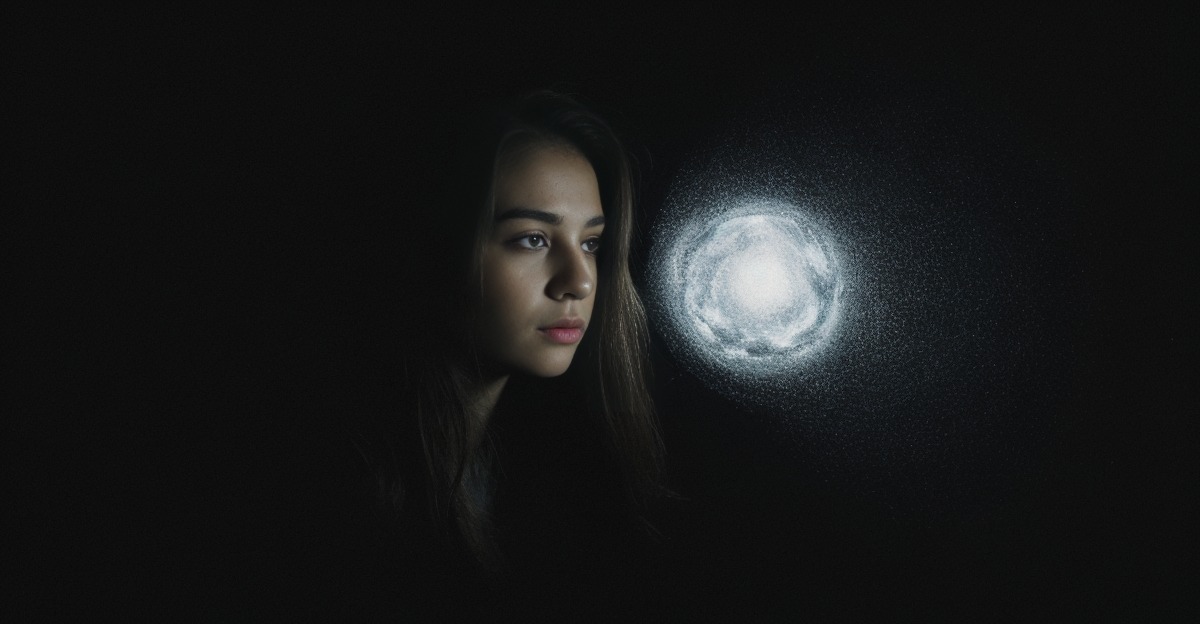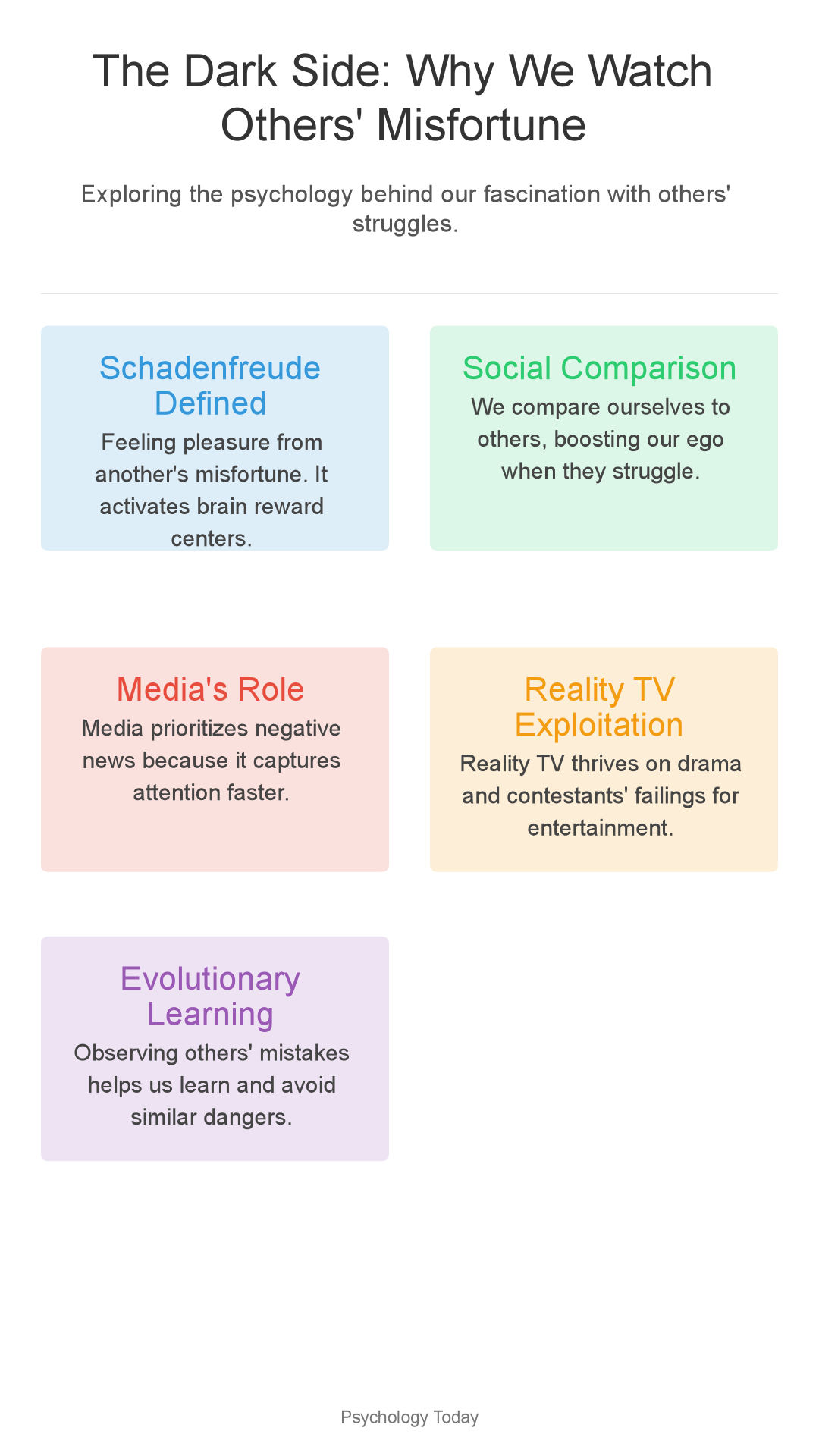
Ever been unable to look away from a car crash? Could our brains be secretly wired to find other people’s misfortunes fascinating? Tap that like button and join us as we unravel the psychology behind our seemingly insatiable appetite for drama and disaster!
We’ve all done it. Scrolling through social media and pausing to stare at someone’s spectacular blunder, a celebrity’s downfall, or even a disastrous DIY project. Is it simply morbid curiosity, or is something more profound at work?
This exploration dives into the psychological and societal reasons behind our apparent fascination with witnessing others’ struggles, examining concepts like schadenfreude, social comparison theory, and the media’s role in amplifying this phenomenon.
The Dark Allure of Schadenfreude: Finding Pleasure in Others’ Pain
Schadenfreude, a German word meaning “harm-joy,” describes the unsettling experience of feeling pleasure, joy, or self-satisfaction when we learn about or witness the troubles, failures, or humiliation of another person. But before you judge yourself too harshly, let’s explore this complex emotion.
Definition and Nuances of Schadenfreude
It’s important to recognize that schadenfreude isn’t always a sign of malice. Sometimes, it stems from a sense of justice, like when a bully finally faces consequences. Other times, it’s fueled by envy or feelings of inadequacy.
Neurological Basis of Schadenfreude
Believe it or not, schadenfreude has a neurological basis. Studies have revealed that experiencing it activates reward centers in our brains, triggering the release of dopamine, the “feel-good” neurotransmitter.
This suggests that witnessing someone else’s misfortune can be inherently pleasurable on a biological level.
Examples of Schadenfreude in Everyday Life
Schadenfreude is surprisingly common. Consider sporting events: the elation fans feel when their rival team suffers a defeat. Or reality TV, where drama and contestants’ personal failings are often the main attraction.
Even everyday moments, like seeing a coworker fumble during a presentation, can spark a fleeting twinge of schadenfreude.
Social Comparison Theory: Measuring Ourselves Against Others (Especially When They’re Down)
Beyond schadenfreude, social comparison theory offers another key to understanding our fascination with misfortune.
Explanation of Social Comparison Theory
Developed by Leon Festinger in 1954, social comparison theory posits that we have an inherent drive to evaluate ourselves by comparing ourselves to others. We do this to gauge our own abilities, opinions, and overall standing in the world.
Downward Social Comparison: Boosting Our Ego
Downward social comparison is where things become particularly interesting. Witnessing someone else’s struggles or failures can provide a boost to our self-esteem. It allows us to feel better about our own circumstances, even if only momentarily.
We might think, “Well, at least I’m not that bad off.
Potential Dangers of Excessive Downward Social Comparison
While downward social comparison can offer a temporary ego boost, over-reliance on it can have detrimental effects. It can diminish our empathy, making us less compassionate towards others.
It can also breed complacency, undermining our motivation to improve.
The Media’s Role: Amplifying Misfortune for Consumption
The media plays a crucial role in fueling our fascination with misfortune. From news headlines to reality TV, we’re constantly bombarded with stories of other people’s struggles.
The “If It Bleeds, It Leads” Principle
The well-worn saying “if it bleeds, it leads” underscores the media’s tendency to prioritize negative or sensational news. This is because negative news tends to capture our attention more readily than positive news.
It activates our threat detection systems, making us more likely to pay attention.
Reality TV and Exploitation
Reality TV takes this to an extreme. Shows often thrive on drama, conflict, and the personal failings of contestants. Producers actively cultivate these situations, knowing that they’ll draw in viewers.
The participants’ vulnerability and missteps become entertainment, often at their expense.
Social Media Algorithms and Negative Content
Social media algorithms further exacerbate this effect. Negative or controversial content often spreads more rapidly than positive content because it’s more likely to trigger strong emotional reactions.
Evolutionary Perspectives: Learning from Others’ Mistakes
Finally, let’s consider the evolutionary perspective. Our fascination with misfortune may be deeply rooted in our survival instincts.
Observing Misfortunes as a Way to Learn
Observing the misfortunes of others can be a valuable way to learn and avoid similar pitfalls. By witnessing someone else’s mistake, we can gain insights into potential dangers and adapt our own behavior accordingly.
Survival Advantage Through Vicarious Experience
The ability to learn through vicarious experience – learning by observing others – provides a significant survival advantage. It allows us to acquire knowledge and skills without having to directly experience the risks and consequences ourselves.
Balancing Evolutionary Drive with Empathy
However, it’s essential to balance this evolutionary drive with empathy and compassion. While learning from others’ mistakes is important, we must also strive to understand and support those who are struggling.
We’ve explored the complex reasons behind our attraction to witnessing misfortune, from the dopamine rush of schadenfreude to the ego boost of social comparison and the manipulative tactics employed by the media. It’s a tangled web of psychology, biology, and societal influences.
So, the burning question is: now that we’re aware of these underlying mechanisms, can we consciously choose to be more empathetic and less captivated by the misfortunes of others?
How can we cultivate a healthier relationship with the content we consume and the emotions it stirs within us? What are your thoughts?
If you found this deep dive interesting, consider subscribing for more explorations into the fascinating and sometimes unsettling world of the human brain!

Enjoyed this? Check out our YouTube channel for video versions!
Enjoyed this? Check out our YouTube channel for video versions!



